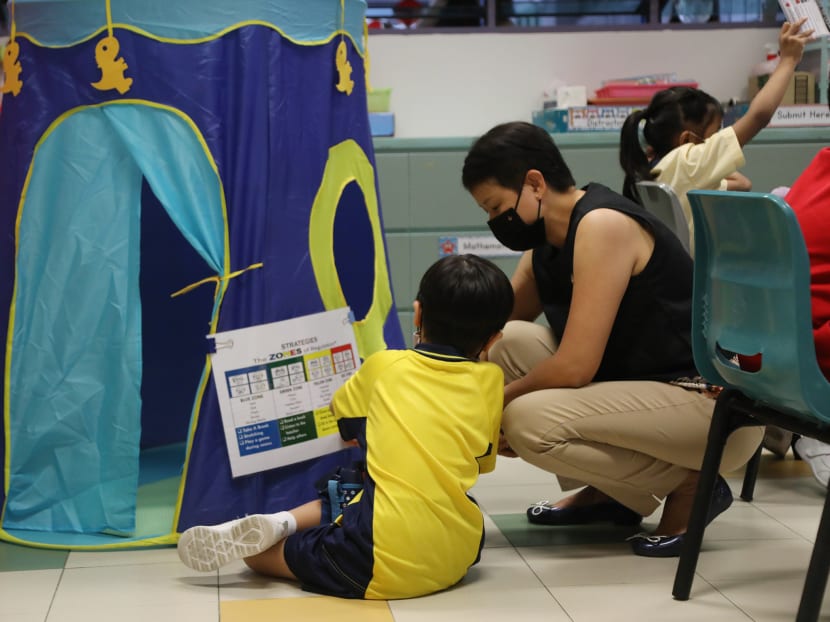‘I have fewer worries’: How one mother found help in programme to help kids transit to primary school
SINGAPORE — Ever since her son was two years old, Mrs Sharlene Tan has struggled to manage his behavioural problems. He would frequently throw tantrums, refuse to sleep and climb on chairs and tables despite being told it was dangerous.

The Transition Support for Integration (Transit) programme helps Primary 1 pupils with behavioural or social difficulties to make the transition into a school environment by learning foundational self-management skills.
- Mrs Sharlene Tan’s son had behavioural problems since he was two years old
- The accounts executive took her son to an occupational therapist to no avail
- His behaviour improved after he was enrolled in MOE’s Transit programme
- The programme helps Primary 1 pupils with behaviour or social difficulties transition to the school environment
SINGAPORE — Ever since her son was two years old, Mrs Sharlene Tan has struggled to manage his behavioural problems. He would frequently throw tantrums, refuse to sleep and climb on chairs and tables despite being told it was dangerous.
The 45-year-old accounts executive even took her son to see an occupational therapist when he was in Kindergarten 1, but the sessions did not result in much changes to his behaviour.
Things only improved when her son, whom she declined to name to protect his privacy, was selected for the Transition Support for Integration (Transit) programme when he started Primary 1 at Elias Park Primary School four years ago.
The programme helps Pri 1 pupils with behavioural or social difficulties to make the transition into a school environment by learning foundational self-management skills.
Elias Park Primary was among the first batch of schools that were selected to pilot the programme in 2017.
Through the Transit programme, Mrs Tan said her son, now 11, has become more sensible and disciplined, and has learned how to manage his emotions better, leading to less frequent meltdowns.
“I have fewer worries after the programme because they really help my son to know what are dangerous acts… From the teachers, he understands and he can talk to me about it. We can discuss it.”
During the debate on the Ministry of Education’s (MOE) budget on Wednesday (March 3), Minister of State for Education Sun Xueling announced that the programme would be rolled out to all primary schools by 2026.
By the end of this year, about 40 schools would have piloted the Transit programme, with five to 10 Pri 1 pupils benefiting from the programme each year.
The students who are identified for the programme need not be diagnosed with any specific condition, said MOE.
Instead, teachers and allied educators will observe students for any social or behavioural difficulties, such as having difficulties paying attention or relating to their peers.
PROGRAMME HELPS PUPILS WITH SKILLS EXPLICITLY
Each school will be allowed to design and manage its own Transit programme based on the needs of its pupils, MOE said.
At Elias Park Primary School, for example, pupils selected for the programme are pulled out into separate classes, each with no more than 10 pupils.
During Transit classes, these pupils will go through the same curriculum as everyone else, but the teacher will infuse self-management skills while teaching the lesson material.
For example, when TODAY observed a Transit lesson at the school on Feb 26, the teacher, Mdm Jessie Wong, 47, encouraged students to demonstrate social skills such as active listening and hand-raising while teaching a lesson on shapes.
Pupils who demonstrated the behaviour were rewarded with tokens, which they can then use to redeem rewards, such as extra play time.
In a week, the pupils would go through nine such lessons lasting 30 minutes each. They stay in the programme for six months to a year, depending on their individual progress.
This year, nine out of the 180 Pri 1 pupils at Elias Park Primary School were selected for the Transit programme, after an observation period of about one to two weeks by teachers and allied educators.
Some of the behaviour that the school looks out for include whether the pupils are able to manage their emotions, and whether they have difficulties with simple classroom habits such as remaining in their seats while class is ongoing.
Mdm Mastura M Hashim, 41, a senior allied educator at Elias Park Primary School, said parents can work together with the school by reinforcing these skills at home.
Mdm Wong said: “Before the programme, I did have children who needed extra support in the classroom, but we had to struggle on our own and learn how to manage these pupils in a class of 30 or 40 children.
“With this programme, the children will be given an opportunity to learn the skills explicitly before we bring them back to their form class. Hopefully they can learn better that way.”








